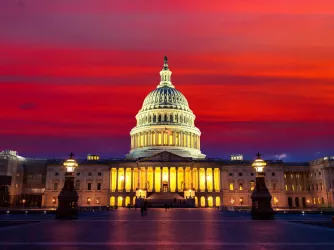Table of Contents
The State of Free Speech on Campus: University of Notre Dame
Throughout the spring semester, FIRE is drawing special attention to the state of free speech at America's top 25 national universities (as ranked by U.S. News & World Report). Today we review policies at the University of Notre Dame, which FIRE has given a red-light rating for its restrictions on free expression.
As with all private schools, which are not legally bound by the First Amendment, we must start by explaining why students at Notre Dame are entitled to expect freedom of expression on campus. The answer can be found in Notre Dame's own mission statement, which emphasizes the importance of free expression and academic freedom to the university's mission. The mission statement provides that
[T]he University insists upon academic freedom which makes open discussion and inquiry possible ... one of its distinctive goals is to provide a forum where through free inquiry and open discussion the various lines of Catholic thought may intersect with all the forms of knowledge found in the arts, sciences, professions, and every other area of human scholarship and creativity. (Emphasis added.)
The university's Open Speaker Policy also protects the free speech rights of Notre Dame students, stating that "Notre Dame students and student organizations are free to examine and to discuss all questions of interest to them and to express opinions publicly and privately." (Emphasis added.
As with so many institutions, however, Notre Dame maintains policies that directly conflict with these stated commitments to free inquiry and expression, limiting the rights of students and faculty to truly speak their minds. At Notre Dame, the policy that most significantly restricts expressive rights is the university's computer acceptable use policy, which prohibits the sending of any "offensive material" over its networks. Given the high volume of communication that now takes place electronically, this policy restricts a tremendous amount of speech. The term "offensive" is left entirely undefined, so it could refer to anything from genuinely abusive or threatening expression to a political argument on a sensitive topic that hurts someone's feelings. In discussions of controversial issues such as race relations, immigration, and so forth, people are undoubtedly offended by arguments they disagree with, but those arguments are still an important part of the "open discussion" that characterizes a liberal arts education. The same policy also prohibits the sending of any electronic communications "contrary to the mission or values of the University." Given that the mission of the university is to "provide a forum" for "free inquiry and open discussion," it is difficult to know what, exactly, is prohibited by this portion of the policy—rendering it impermissibly vague. Even if the university does not, in practice, use its acceptable use policy to censor controversial political speech, its very existence chills free speech on campus and undermines the climate of academic freedom and free inquiry that Notre Dame seeks to maintain.
Also, the university's Student Life Policies prohibit "any disrespect ... directed at any [residence] hall staff member or other University official," as well as "any willful damage to the reputation or psychological well-being of others." Both of these provisions prohibit a great deal of protected—and, in some instances, socially valuable—expression. The provision prohibiting any disrespect of university officials could be used to punish virtually any criticism of the university or its administration. The suppression of this type of speech is a major problem on college campuses nowadays. For example, this past fall, Binghamton University's Department of Social Work ordered the suspension of master's student Andre Massena after he posted flyers criticizing the department for having hired the executive director of the Binghamton Housing Authority—an agency Massena thought was responsible for social injustice. And Michigan State University recently used its bulk e-mail policy to punish a student government leader who criticized administration plans in an e-mail to professors. Most often—as in the cases of Binghamton and Michigan State—universities have to creatively use other policies to silence criticism of their administrations, but Notre Dame's policy prohibits such criticism outright!
The provision prohibiting "any willful damage to the reputation or psychological well-being of others" is also outrageously overbroad. While speech that damages someone's reputation through falsehoods may be prohibited as libel or slander, legitimate criticism that rightfully damages someone's reputation is protected, and in some cases very important, speech. Moreover, the term "psychological well-being" is vague and undefined, and it could mean anything from severe emotional distress to mere hurt feelings. As such, this language could be used to prohibit virtually any subjectively offensive expression.
Finally, the university's posting policy requires that any postings on university bulletin boards be in "good taste" but leaves this term wholly undefined, giving university administrators unfettered discretion to decide what is suitable for posting and what is not. What if an administrator feels that it is in poor taste to harshly criticize government or university policy, or to advertise an upcoming speech by a controversial speaker? Certainly, the university has the right to prevent obscene or harassing communications from being posted on its bulletin boards, but this policy—with its overly broad language—opens the door to abuse of discretion by university administrators. To be appropriate to Notre Dame's ideal of free expression, this policy must be far more narrowly drawn.
As you can see, Notre Dame must make several important revisions to its policies if it is truly to live up to its goal of being a forum for the free expression of ideas. Stay tuned for information next week on the state of free speech at Emory University.
Recent Articles
FIRE’s award-winning Newsdesk covers the free speech news you need to stay informed.

One day after FIRE lawsuit, Congress passes changes to filming permits in national parks

VICTORY: FIRE lawsuit leads California to halt law penalizing reporters, advocates, and victims who discuss publicly known information about sealed arrest records

O holy fight: New Hampshire Satanic Temple statue threatened by more than vandals
